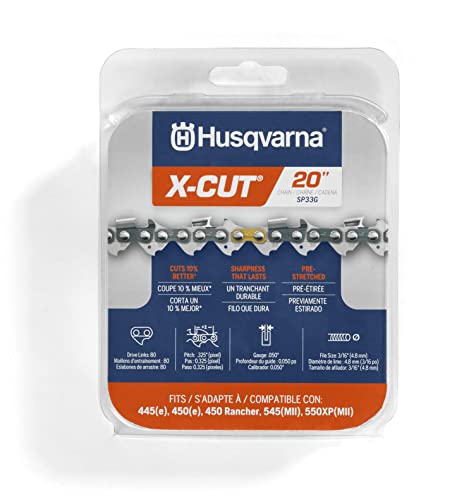When it comes to tackling the great outdoors, whether it’s for clearing land, cutting firewood, or taking down that old tree that’s been threatening your roof, the right chainsaw can make all the difference. We’ve all been there, standing in the hardware aisle, trying to decide between an Echo and a Husqvarna chainsaw. Both brands have their loyalists and for good reason. They’re powerhouses in the world of outdoor equipment, known for their reliability, durability, and performance.
But how do you choose between the two? It’s not just about flipping a coin; it’s about understanding what sets them apart and what aligns with your needs. We’re here to dive into the nitty-gritty of Echo vs Husqvarna chainsaws, breaking down their features, performance, and value to help you make an informed decision. After all, it’s not just about the tool; it’s about making your outdoor tasks easier and more enjoyable.
Echo vs Husqvarna Chainsaw: An Overview
In the realm of outdoor power tools, particularly chainsaws, Echo and Husqvarna stand out as two of the industry’s giants. Both brands have cultivated a reputation for producing chainsaws that not only meet but often exceed the expectations of their users. Understanding the nuances between Echo and Husqvarna chainsaws is crucial for anyone looking to invest in a tool that’ll turn daunting outdoor tasks into manageable, even enjoyable ones.
Echo chainsaws are renowned for their durability and robustness, especially in demanding environments. Many models boast features like heavy-duty air filters and vibration-reduction systems, which contribute to their longevity and user comfort. Echo’s commitment to innovation is evident in their Pro-Fire ignition system, which ensures easy starts and smooth operation, a boon for both seasoned loggers and homeowners alike.
Husqvarna, on the other hand, excels with its focus on user-friendly features and environmental sustainability. Their chainsaws often come equipped with X-Torq engines, designed to reduce harmful exhaust emissions while improving fuel efficiency. This makes Husqvarna models a popular choice for those mindful of their environmental footprint. Additionally, features like the LowVib system reduce vibration, enhancing comfort and reducing user fatigue during prolonged use.
Both brands offer a wide range of models, from lightweight, easy-to-handle options suitable for light yard work, to heavy-duty models designed for professional forestry work. This diversity ensures that regardless of your specific needs, be it tidying your garden or managing a woodland, you’ll find an Echo or Husqvarna chainsaw that’s up to the task.
Choosing between Echo and Husqvarna chainsaws essentially comes down to personal preference and specific requirements. If durability and ease of use are paramount, Echo might be the way to go. For those prioritizing environmental considerations and user comfort, Husqvarna’s offerings could prove more appealing. Overall, both brands promise reliability, efficiency, and the power needed to get the job done right.
Key Features Compared
Continuing from our overview of Echo and Husqvarna chainsaws, let’s dive deeper into their key features, comparing them side-by-side to provide a clearer understanding of what sets these brands apart.
Engine Performance
Echo chainsaws come equipped with engines that emphasize high output and efficiency. The Pro-Fire ignition system ensures a quick start, minimizing the fuss in getting the chainsaw up and running. In contrast, Husqvarna’s X-Torq engines aren’t just about power; they’re designed to reduce harmful exhaust emissions by up to 60% and increase fuel efficiency by up to 20%. If you’re conscious about the environment and operational costs, Husqvarna might have the edge here.
Durability and Maintenance
Echo prides itself on chainsaws that are built to last, featuring heavy-duty air filters that extend the life of the engine by preventing dust and debris from entering. This means less maintenance and more reliability over time. Husqvarna, while also durable, incorporates the AutoTune feature, which automatically adjusts the engine settings to ensure optimum performance and reduce the need for manual carburetor adjustments. Both brands offer robust solutions, but Echo’s focus is on physical durability, whereas Husqvarna combines durability with smart technology for maintenance ease.
User Comfort and Safety Features
Husqvarna leads in this category with its LowVib technology, significantly reducing vibration levels to minimize fatigue during extended use. Additionally, their chainsaws come with ergonomic handles and are generally lighter, enhancing maneuverability and comfort. Echo, while offering comfortable grips and effective anti-vibration systems, tends to have slightly heavier models, which might be a consideration for users seeking lightweight options for prolonged use.
Conclusion
Both Echo and Husqvarna chainsaws have their unique strengths, catering to different user preferences and needs. Echo excels in creating durable, high-performance chainsaws for those prioritizing longevity and ease of use. Husqvarna, on the other hand, shines with its eco-friendly engines and features focused on reducing user fatigue, making them ideal for environmentally conscious individuals and those using chainsaws for extended periods. Your choice should align with your specific requirements, whether they be geared towards environmental sustainability, comfort, or durability.
Price Comparison
Diving into the price comparison between Echo and Husqvarna chainsaws, we find distinct differences that cater to various budgets and needs. Echo chainsaws, known for their innovation and durability, tend to offer competitive prices that appeal to both professionals and homeowners. Typically, Echo’s starting range for a basic chainsaw model can be around $200, making it an attractive option for users seeking reliability without a hefty price tag.
On the other hand, Husqvarna chainsaws, with their emphasis on environmental sustainability and user-friendly features, are generally positioned at a slightly higher price point. The starting price for a Husqvarna chainsaw hovers around $250, reflecting the incorporation of advanced technologies like X-Torq engines for reduced emissions and increased fuel efficiency. Husqvarna’s commitment to comfort and safety features, such as LowVib and AutoTune, also contributes to the higher cost. However, these technologies offer long-term savings through fuel efficiency and fewer maintenance requirements.
When considering mid-range models suitable for more demanding tasks, Echo chainsaws still maintain a cost-effective edge, with prices ranging from $300 to $500. These models provide enhanced engine outputs and robust constructions, perfect for tougher jobs.
Husqvarna’s mid-range offerings, priced between $350 and $600, include additional features like ergonomic designs and better vibration dampening systems, making them ideal for extensive use without compromising user comfort.
For heavy-duty, professional-grade chainsaws, both brands offer high-end models that can exceed $1,000, depending on the specifications and features. These models are designed for intense, prolonged use and come equipped with the most advanced features each brand offers, including increased power outputs, durability, and the latest in chainsaw technology.
In essence, while Echo provides affordable, durable options, Husqvarna leans towards a higher initial investment that promises enhanced environmental features and user comfort. Depending on individual requirements and budget, consumers can choose between the two, ensuring they get a chainsaw that best fits their needs and preferences.
User Experience and Reliability
Building on our comparison, let’s delve into user experience and reliability, critical areas where Echo and Husqvarna chainsaws stand out. Each brand tailors its products to meet specific user needs, focusing on how the chainsaw feels in action and its performance over time.
Beginning with Echo, users often praise the brand for its chainsaws’ ease of starting and handling. The intuitive design allows for quick adjustments and straightforward maintenance. Echo chainsaws generally receive high marks for their stamina and resilience, particularly in tough conditions. Thanks to robust engines and well-constructed bodies, professionals and homeowners alike report fewer issues over the lifespan of their chainsaws. The brand’s commitment to durability means less downtime and more productivity, a significant advantage for those relying on their tools for extensive projects.
Switching gears to Husqvarna, the brand is celebrated for integrating user comfort and safety into its engineering. The LowVib technology notably reduces vibration, minimizing fatigue during prolonged use—an essential feature for professionals. Users also enjoy the AutoTune feature, which ensures optimal engine performance without manual adjustments, adapting to different fuels, altitude, humidity, and temperature. This smart maintenance reduces the likelihood of improper settings that could lead to engine damage, enhancing reliability. Furthermore, Husqvarna’s emphasis on ergonomic design not only improves user comfort but also helps prevent strain and injury, contributing to its reputation for reliability from a user’s perspective.
Experience and reliability intersect where Echo offers a straightforward, robust tool designed to endure, while Husqvarna focuses on optimizing the user’s interaction with their chainsaw, ensuring comfort, and promoting longevity through intelligent features. Ultimately, the choice between the two might hinge on whether a user prioritizes the rugged durability of Echo or the advanced user-centric innovations of Husqvarna.
Environmental Impact
In the realm of environmental impact, both Echo and Husqvarna chainsaws stand out, albeit with their own distinctive approaches to eco-friendliness. Echo chainsaws, known for high engine output and efficiency, also contribute to environmental care by optimizing fuel consumption. This effort ensures that less fuel is wasted per cut, indirectly reducing the overall environmental footprint of their operations.
On the other hand, Husqvarna takes a more direct approach with its X-Torq technology. This innovation specifically aims at reducing exhaust emissions significantly while also enhancing fuel efficiency. By integrating X-Torq engines into their chainsaws, Husqvarna not only adheres to strict global emission standards but also ensures that users can undertake longer tasks with less environmental impact due to reduced fuel consumption.
Additionally, Husqvarna’s incorporation of AutoTune technology automates engine adjustments for optimal performance and emissions. This smart feature not only simplifies maintenance but also ensures the chainsaw is always running at peak efficiency, thus minimizing its environmental footprint.
Both brands offer solutions that appeal to environmentally conscious consumers. Echo focuses on general efficiency to minimize waste, while Husqvarna emphasizes specific technologies like X-Torq and AutoTune to directly reduce emissions and fuel consumption. Our comparison underlines a commitment from both manufacturers to not only meet the needs of their users but also to address the broader concerns of environmental sustainability in their product designs and functionalities. As we consider the environmental impact of Echo vs Husqvarna chainsaws, it’s clear that our choice can reflect our commitment to preserving the planet, with each brand offering distinct paths to achieve this goal.
Conclusion
We’ve delved into the nuances between Echo and Husqvarna chainsaws, uncovering the strengths that each brand brings to the table. It’s clear that whether you’re leaning towards Echo for its robust durability and efficiency or Husqvarna for its user-friendly features and commitment to the environment, you’re making a choice that reflects a balance between performance and sustainability. Both brands have shown a dedication to reducing their environmental impact, albeit through different approaches. As we wrap up, remember that the best chainsaw for you depends on what you value most – be it innovation, comfort, environmental sustainability, or all of the above. Happy chainsawing!
Related Posts:




















